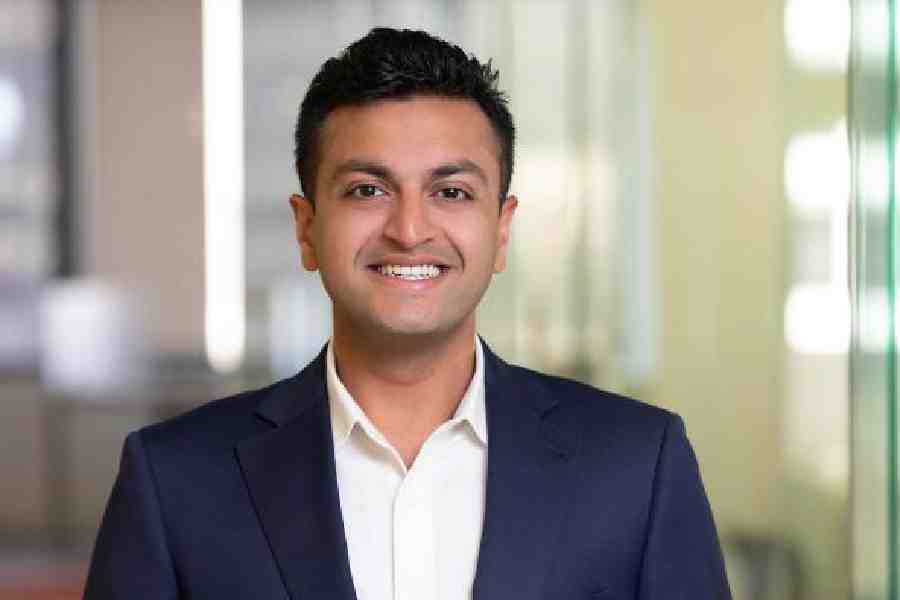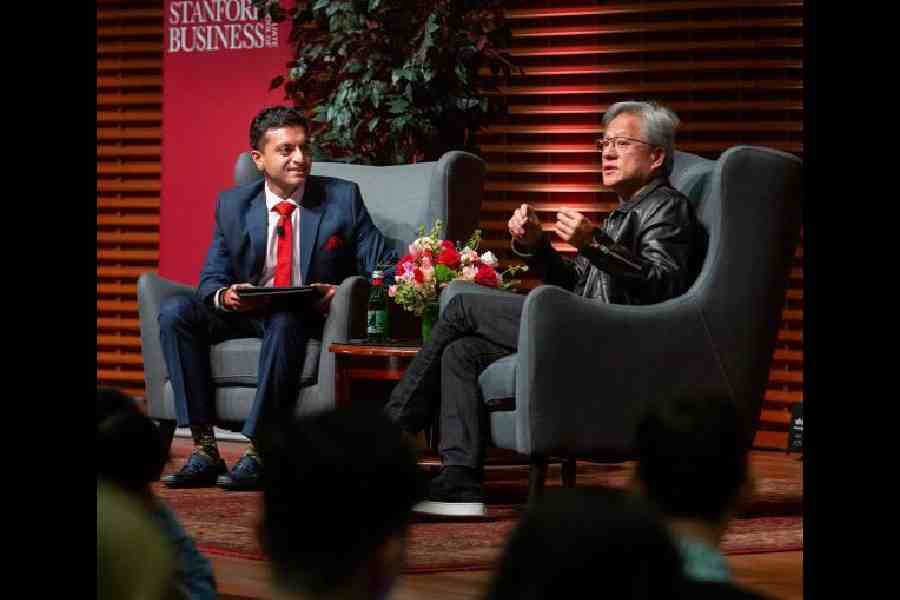For Shantam Jain, his recent annual visit to Calcutta held out a milestone — his grandfather turned 80. A few weeks prior to the visit, another achievement was unlocked. Shantam, who is currently completing Stanford University’s coveted MBA programme, recently interviewed a man who is always in the news — NVIDIA founder and CEO Jensen Huang, as part of Stanford University Graduate School of Business’ View From The Top speaker series.
Spending a relaxed Sunday morning at his Chakraberia residence in Ballygunge, Shantam mulled over the state of AI and what it could offer to the world. He is cautiously optimistic.
“AI is going to change functionally how we perform different business tasks. Over the next decade, any job that is repetition-based, anything that doesn’t require human creativity, innovation, or decision-making, will likely be displaced by AI. But I don’t necessarily see this as a bad thing. AI is now hitting mainstream and companies all over the world are starting to adopt it. Governments all over the world are also paying attention. But this is similar to 20 years ago, when search and the Internet were hitting mainstream. We didn’t know what was going to happen. You could ask — would the mailman become extinct if emails would become the preferred way for people and businesses to communicate? Were people who made physical accounts for business going to be jobless because most of the work would be done in Excel and accounting software? The AI-driven technological inflection is similar to the ones of the past, whether it was the Internet, the computer, the iPhone, or other commonplace technology today,” said Shantam, who prior to moving to Stanford spent around a decade in Los Angeles where he studied at the University of California and worked in private equity.

Shantam Jain with Jensen Huang, CEO of NVIDIA
‘AI is great for the economy’
His work profile puts emphasis on the startup and venture capital ecosystem. He is looking at the next generation of AI businesses that are going to take over the enterprise software landscape. He is also a faculty member for the Stanford campus incubator where teams are helped through the ideation phase of creating a business.
“You’re seeing computer intelligence that can augment the work of humans at enterprises, so instead of having a set group of, say IT professionals that manage enterprise software, now you can have thousands of AI agents that augment the repetitive work. One of the teachings that I really honour and appreciate is that AI helps companies improve their productivity. When companies improve their productivity generally their profit margins increase. When profit margins increase, it is rare that they then go and say: ‘Hey, let me go and fire a bunch of people because my profits just went up.’ Profits going up normally signals investment in other categories, in other areas, so I think AI is great for the economy. However, I do think that there will be some skills-based displacement and so that’s the big risk,” said Shantam. “This is also an opportunity to upskill our workforce, just like we did when computers and Internet software came out”.
Shantam attended St. James’ School and he has always been an avid debater besides being a MUN-er (Model United Nations), representing the institution and winning several accolades. Next stop: Chakraberia to the US to pursue economics and at UCLA he continued his passion in public speaking and was named among the top 12 MUN debaters in North America. Now at Stanford, he is one of the four MBA students who were chosen to interview some of the world’s most distinguished business leaders for the Dean’s speaker series. Past guests have included CEOs such as Sundar Pitchai, Satya Nadella, Steve Jobs, Ajay Banga, Indra Nooyi and Neal Mohan.
He is at Stanford at a time when almost all talks globally involve AI and Shantam feels there is an element of risk involved if we are not careful. “The other risk is obviously threats to privacy. AI is going to enable hyper-specialisation. Right now, we all watch the same content on Netflix. But imagine a future where episodes and videos may be hyper-catered to our interests and desires and the computer generates the film as we watch it. The flip side of that is now computers and companies know us a lot better. They have all the data on us, that they can very clearly predict our daily routines, our actions and our preferences and that leaves us vulnerable because they can then use that to modify or influence action on our part that we might not have taken without it.”
Chip diplomacy
Using AI is one part of the business. Manufacturing chips to power generative AI models is another important aspect. As the West progresses on the chip manufacturing side, some governments will try to stifle the flow of knowledge to other parts of the globe. Chip diplomacy is real and here to stay.
“Regardless of who owns chips, like NVIDIA owns chips, it’s important to see where these are being manufactured, which is largely in Taiwan by TSMC. Although these chips are all being manufactured in Asia, the IP is not owned by Asian countries, so Asia is not getting the full upside from being the ones that put these things together. Why? Because the West is heavily investing into the R&D of chips. It will require mass investment. I think just based on the size of our scholars compared to the West, we do have a huge population advantage over the US.”
Even though “brain drain” is still real, things are improving and there are many students who are coming back after finishing their studies. “Friends of mine who are PhD in computer science at Stanford, at times talk about coming back to India and building India’s foundation models. But a vast amount of investment is required to be able to do something like that.”
And what did he learn from speaking to Jensen Huang, whose company has quickly reached multi-trillion-dollar valuation? “He is just so humble and down to earth. He is not shy about saying that he probably understands computers and the hardware side of computing better than any other living breathing person on this planet because he has studied the history of each element of computing. That being said, to get to where Jensen is today, you have to go through the 30 years that he’s gone through. The rejection, the finger pointing, the non-believers. His legacy is a masterclass and we have so much to learn from it. They made the initial bets in AI and ML. It has been a long story of perseverance, resilience, grit, and a never-say-die spirit.”
Watch Shantam Jain’s full interview of NVIDIA CEO Jensen Huang on YouTube











